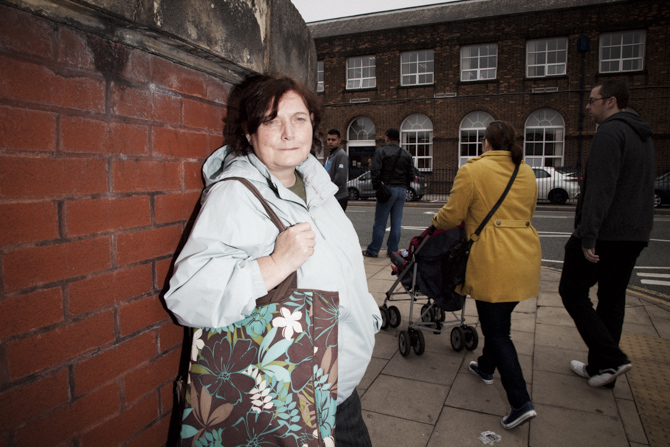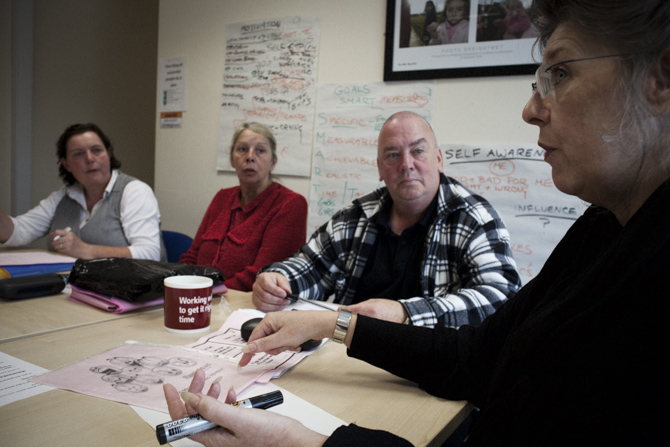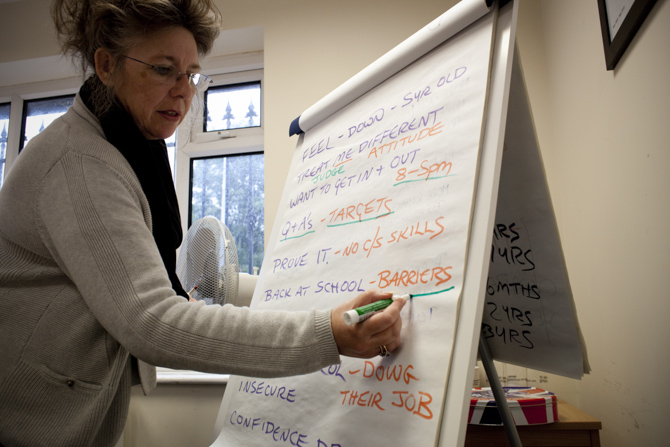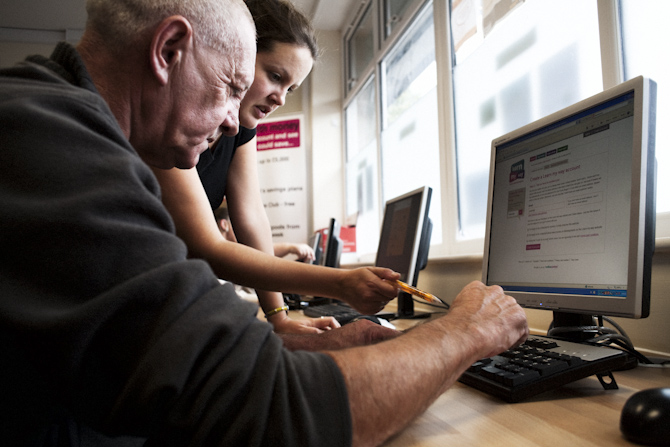Morag is easy to talk to. She must have told her horrific story to plenty of professionals over the last 27 years, so re-telling it to me over a hot chocolate in Morrisons is not an ordeal. She admits, though, she hasn’t got ‘closure’ on much of it and gets upset recalling particular details.
Morag tells me about the violence back home in Glasgow, the calls to the police, the terrifying ordeals, one after another. “He had a knife to my throat,” she says, reaching for another tissue. “As soon as I could, I fled but my baby was still inside, with him. It was four days before the police could get in and I got my daughter back.”
Her husband ended up in prison but not, ironically, for the violence he heaped on her. There’s more to this story than is necessary to tell.
“For six months, I wouldn’t leave the house. I tried but I couldn’t move. One day I walked to the local shop but it felt like the walls were moving in on me.”
“My cousin was in Bolton and suggested I moved down here, for a fresh start, so I did. My daughter still hadn’t started school and I couldn’t afford childcare so I went to college. There was no way I was sitting around doing nothing.”
But despite her best efforts Morag couldn’t get back on her feet. She was hospitalised after her stomach muscles fused together. “He never touched my face,” she recalls, “instead he’d kick me in the stomach. Always the stomach. I had to have emergency surgery.”
She was diagnosed with post traumatic stress disorder and spent more than a decade on medication.
“I thought everything was okay, but I was just plodding along, getting my daughter to school. But she was really the one looking after me. Every morning she’d ask me if I’d taken my tablets.”
“How old was she at this point?” I ask.
“Five,” says Morag.
“So, let me get this right. That violent relationship has affected you, both mentally and physically, for the past 27 years?”
She nods. “And last year I got a call to say that my money was stopping and I had to apply for another benefit.”
Morag is one of tens of thousands of disability benefit claimants who have been assessed under the government’s work capability assessment programme in a drive to get people into work and reduce welfare payments.
She was questioned by Atos Healthcare, the private company commissioned by the Department of Work and Pensions, and was subsequently declared fit for work. She appealed against their decision and attended a tribunal.
“It was terrifying,” she says. “There was a Justice of the Peace and a medical examiner and they fired questions at me for an hour. At the end of it they said they were going to fail my appeal. And that was it. I was on Jobseeker’s Allowance and had £160 less each month.”
“Do you feel you are fit for work?”
“I do and I don’t. I want to work. I’m sick of relying on benefits.”
“And now you’re on Jobseeker’s Allowance and living off £15 a week after you’ve paid your bills?”
“But I’ve got absolutely brilliant friends. They give me bits of food and clothes. They gave me this,” she says, tugging at her coat. “But I don’t know how anyone would cope if they didn’t have the friends I had. How would they manage?”
“And how helpful has the UCAN Centre been?”
“I just love them. They’ve really helped to build up my confidence. I’m not there yet but I’m nearly there… we’re nearly there. The course I did with Cath was brilliant. I didn’t know myself. It’s opened my eyes.”
It turns out that, as well as the employment support, Morag is about to tap into the counseling service that comes to the UCAN every week.
It’s two weeks later and I am walking with Morag through the town centre to one of Bolton’s two Jobcentres. A report on the radio this morning suggested there are nearly as many new store openings on UK high streets as there are closures. Bookmakers, charity shops and pawnbrokers top the list of new openings.
“When did you last have a job?” I ask as we negotiate a busy crossing.
“Because of my health I haven’t worked for 27 years,” says Morag, “except for a few weeks as a classroom assistant. I’ve been on Incapacity Benefit. But now I’ve been put on Jobseeker’s Allowance. I came yesterday to sign on and this morning I’m seeing my advisor. I have to show I’ve been looking for work.”
“What happens if you can’t show you’ve been looking?”
“They can sanction you. They can take some of your money from you.”
We reach a nondescript two-storey building opposite a bingo and casino complex. It must only recently have become a Jobcentre because the only signs yet up are those declaring the building is protected by G4S.
“Cath said I have to go in with a positive attitude. I’m supposed to smile… to say it’s been nice weather. The woman will look at me as if I’m mad.”
Morag says she’ll be ten minutes but it’s nearer half and hour before she is out on the pavement again.

“So what did you say to her?”
“I said, Good Morning!” she says in a high-pitched, cheery voice. “But she just said, Yeah.”
“And what did you talk about?”
“She went through my CV but wasn’t very happy. She said there was no point saying I wanted to be a classroom assistant on a CV that I was sending in for a retail job. I have to do more specific ones for particular types of jobs.”
“That makes sense. Do you know how to do that?”
“There’s someone at the UCAN job club who will help me. He’s really good with CVs.
“And then there’s a thing called Universal…” Morag thinks for a second, “… Universal Jobmatch. You have to register online and they give you a number. And you have to keep logging in with that number and going through all the jobs. That way they can see if you are actually looking for work.
“She said for next week I definitely have to be on it, otherwise she could dock money off me. She might say I haven’t earned my money one week and that will be it. You have to toe the line.”
“And how much do you get each week on Jobseeker’s Allowance?”
“£71.70.”
“£71.70? And how much do you have to live off after bills and that?”
“£15 a week before I’ve bought any food. They’ve taken £160 a month off me.”
“We should sit down and have a longer chat,” I suggest.
The participants, having enjoyed sharing what they hate about the JobCentre, are a little taken aback at having to see the situation from the other side. Everyone’s quiet as they try to imagine the scenario from the opposite angle. Cath suggests that the advisors will have targets and be under pressure to meet those targets.
“They still don’t have to talk to people the way they do,” says Morag. “They could talk to people nicely.”
“They must be like us though,” says a woman in a red top. “They must have good days and bad days.”
“What happens, do you think, when they leave the Jobcentre at the end of the day?” asks Cath.
“They forget about us,” says Morag.
“How do you know that?”
“I don’t. But that’s what I would do. I wouldn’t want to go home with my work.”
“But they’re not put in a cupboard to be recharged for the next day, are they?”
“They probably have pressures of their own,” says the woman in red, as the penny starts to drop.
“They are human beings like we are and they’ll have the same pressures: our bills, our debts, kids in trouble. Just because they are Jobcentre advisors doesn’t mean they’re not living every day like we are. And then they’ve got the likes of Mr Cameron telling them they’ve each got to get, say, 120 people into a job this month.”
“When there aren’t any,” someone says.
“When there aren’t any,” repeats Cath. “So, do you think they feel pressure? Of course they do. Even before they open the door to you guys.”
“And then we knock on the door,” laughs one of the men.
“Do you think they feel insecure? Is there a chance on it?” continues Cath. “With all that they have going on, do you think there’s a chance some of them might feel insecure?”
There are reluctant nods from around the room.
“So, what do you think would help your next visit to the Jobcentre? What could you do?”
“Smile,” someone says quietly as if breaking ranks.
“Walk towards them smiling,” repeats Cath.

Ten minutes ago it would have been like throwing a hand grenade into the room if someone had suggested smiling at a JobCentre advisor but Cath has got them there – most of them anyway – and now the group realise that it’s their own attitude that affects the outcome of their Jobcentre experience.
“Won’t it get me into trouble though?” asks Morag.
“When was the last time anyone was imprisoned for smiling?” suggests Cath, with a big grin. “If you understand a bit more about them and have more self awareness about yourself then you can actually help to change their approach towards you.
“It’s about making it a win-win situation for you. And please don’t think the Jobcentre advisors are out to get you. They’re not. Change that perception. They have their limitations like we all do.
“And don’t expect them to do everything for you, because they can’t. Remember the UCAN has got experts to help you with a CV… we want you to have the best.”
I haven’t taken my coat off and Vanessa has already introduced me to Cath, a freelance employment advisor.
“What do you do at the UCAN?” I ask her as a mug of tea is pushed into my hand.
“Whatever people need to do with employment and training,” she says. “If we hear that ten people are looking to get a store job in the run-up to Christmas then I’ll put on a little course on applying for retail jobs. That sort of thing.”
This UCAN prides itself on its responsive approach. Why offer apples when people want oranges, I had been told. There’s no point delivering services that no one needs.
Today is day three of a four-day course Cath is running to boost self-esteem and motivation. Before she can explain the ins and outs we’re interrupted by a knock on the door. The centre isn’t officially open for another 15 minutes.
“Can I use the phone?” asks a middle-aged man. “Vanessa said I could come early. I need to call them about my tax credits and make sure they’ve got my new address.”
Cath lets the man in and as soon as she sits down again there’s another knock on the door. It seems we’re not going to manage even the briefest of conversations. “I’ll pop up to your course later,” I say, “if that’s okay.”
Today it’s going to be busy. It’s money day and both Dawn from Money Skills and Steve from the Hoot credit union are in. And so is Jade from Think Positive, an ‘emotional wellbeing’ service. Vanessa introduces me to them all as the UCAN Centre starts to fill up with customers.
I’m feeling a little overwhelmed by it all and I take my tape recorder and camera and take refuge in Cath’s course in the upstairs meeting room.
Two men and four women are sitting round a table strewn with sweets and biscuits. Cath is asking about their perceptions of the Jobcentre. “You say it’s depressing as soon as you walk in, but what, specifically do they do to you?

She is bombarded with negatives about people’s Jobcentre experiences and, pulling the top off a marker pen, has trouble writing them on her flip chart fast enough. “It’s horrible, I hate it… They ask you lots of questions: What jobs have you been looking for? Can you prove it?… It makes you feel like you’re back at school… You feel belittled…”
“As soon as you walk in that door your confidence just goes,” says one of the women. “You feel insecure.”
“You feel insecure, Morag? Isn’t it amazing how powerful this Jobcentre is? Look what it does to us,” says Cath, looking up from the flip chart.
“So let’s put ourselves in their shoes. We’re a Jobcentre advisor now. Do you think everyone walking towards their desk will have a gorgeous smile on their face?”
We’re all sat in the front room, practically eating our lunches off mouse mats – the computers and keyboards take up most of the available desk space.
Carl is closest to the front door and jumps up each time there’s a knock. “We’re open again at half past,” he repeats politely, “we’re just getting ourselves something to eat. Are you all right to come back in half an hour? Great, see you later.”
Between mouthfuls of pasta from a plastic tub, Vanessa, the UCAN manager, tells me that the afternoon is set aside for an IT class. “It’s very relaxed,” she says. “We’ve discovered that a drop-in works better than a formal course. Customers don’t have to stay for the whole session – which can feel daunting – but most of them do.”
“If people can get to know how the computer works then they are more likely to access services online. If we are being posh, we’d call it digital inclusion.
“Last year the government changed the way jobseekers look for work. All new jobseekers now have to set up a government online account – which is challenging enough – and then upload a CV before they can start looking for a new job.
“The theory is great if you are IT savvy,” she says. “But when you mention uploading a CV to some of our customers you might as well be talking a different language.”
“So, if someone finds themselves out of work,” I say, “it could be several weeks before they are able to learn the necessary IT skills to apply for another job?”
“Yes, some have never touched a keyboard before,” says Vanessa, “and it was bedlam in here when it was first introduced. People were dead nervous.
“The CV is now the Willy Wonka golden ticket,” she says. “Gone are the noticeboards in the Jobcentre, all the available vacancies are now online on what’s called the Universal Jobmatch. And the Jobcentre can now check whether you’re actively searching for a job and impose sanctions if you’re not.”
As plates and mugs find their way back to the kitchen sink, freelance IT tutor Charlotte, arrives and within minutes four participants follow and settle themselves in front of a screen. I explain to Charlotte and her class about this blog, “I’d like to take some pictures if that’s okay with everyone, and maybe ask a few questions.”
“Paul is one of our star pupils,” says Charlotte, pointing out an older man who has already logged on. So I start with Paul.
“Seven months ago I was made redundant from my job as a driver,” he says. “For ten years the only computer I’d used was the sat nav! I didn’t even know how to switch one on.”
After coming to a few Monday afternoon sessions Paul says he found his way round the PC. “It’s no problem now. I’m starting a new job tomorrow and they asked if I could use a computer and I said I could. So I’ll be doing some forklift truck driving and keying in goods in and goods out, that sort of thing. They’ll show me what to do, won’t they?”
“I’m sure they’ll give you some training before they let you loose,” I say. “Do you mind me asking, how old are you Paul?”
“61.”

Another older man comes in as I’m talking to Paul and I overhear him tell Charlotte that he needs some help uploading his CV onto the Universal Jobmatch site. “That’s fine,” she says, “and it’s something I can help you with but I try and start everyone off with a little online course about finding their way around the keyboard. Are you okay if I set you off with that first?”




